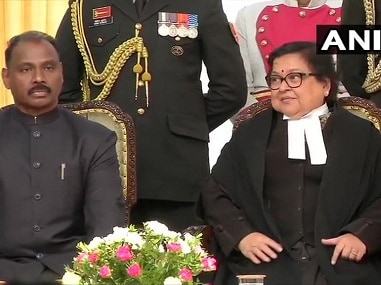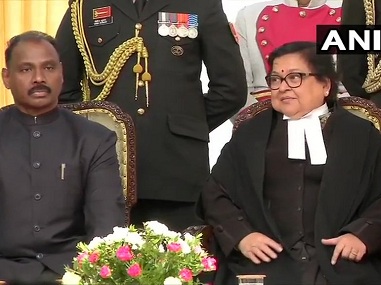The state of Jammu and Kashmir was officially bifurcated into two union territories on Thursday. The union territories of Jammu and Kashmir and Ladakh came into effect under the Jammu and Kashmir Reorganisation Act on the same day as Sardar Vallabhai Patel’s 144th birth anniversary GC Murmu and RK Mathur were sworn as Lieutenant Governors of Jammu and Kashmir and Ladakh in Srinagar and Leh respectively. This is the first time that a state has been reorganised into union territories. India now has 28 states and nine union territories. [caption id=“attachment_7580431” align=“alignleft” width=“381”]  Jammu and Kashmir Lieutenant Governor GC Murmu and Chief Justice of Jammu and Kashmir High Court Gita Mittal at the oath-taking ceremony held in Srinagar. ANI[/caption] J&K to have 114-member Assembly While Jammu and Kashmir will have an elected Assembly and council of ministers headed by a chief minister, Ladakh will be under the Lieutenant Governor’s rule. Jammu and Kashmir Assembly will increasing from its current strength of 107 seats to 114, requiring the delimitation of constituencies. It will have a term of five years, instead of the state Assembly’s term of six years. Union Territory of Jammu and Kashmir will have five Lok Sabha MPs and four Rajya Sabha MPs. Ladakh will have one Lok Sabha MP. If there is any inconsistency, Parliament’s laws will prevail over any law passed by the new Assembly. The Legislative Council of Jammu and Kashmir will stand abolished. Jammu and Kashmir was one of the seven states to have a legislative council. Special powers for Lieutenant Governor The Lieutenant Governor can nominate two women representatives in the Jammu and Kashmir Assembly, if he feels there is inadequate female representation. All bills will also require the Lieutenant Governor’s assent, who can approve, withhold or sent the bill for consideration to the President. “Earlier, the chief minister through his cabinet could transfer officers. Now, only the LG will be able to do it,” an officer told The Print. State constitution, Ranbir Penal Code abolished All laws that mention “applicable to all of India but not the state of Jammu and Kashmir” will be repealed. One hundred and fifty three state laws have also been repealed, while 166 laws have been retained. Over 100 central laws will apply to Jammu and Kashmir. Various laws related to owning land and property in the Union Territory of Jammu and Kashmir have been amended. Some of these laws include The Transfer of Property Act, The Jammu and Kashmir Alienation of Land Act, The Jammu and Kashmir Land Grants Act and The Jammu and Kashmir Agrarian Reforms Act. Other key laws that have jurisdiction over Jammu and Kashmir and Ladakh are Right to Information, Right to Education, laws governing Panchayati Raj institutions, rights of Hindus and Sikhs as minority communities, reservation of seats for SCs and STs in legislature, jobs and education, laws concerning scrutiny of government expenditure by the Comptroller and Auditor General, right of Indians from other states to own property and settle in Jammu and Kashmir and Ladakh. Kashmiri women will not be denied the right to inheritance if they marry someone not belonging to the Union Territory and Pakistani nationals will not be eligible for Indian citizenship by marrying Indian women from Kashmir. The Constitution of Jammu and Kashmir and the Ranbir Penal Code will cease to exist. Centre’s welfare schemes too will now be applicable in the union territories. Financial emergency can be declared to the two union territories like any other state. Earlier, it required only in the scenario of a “war or an external act of aggression” could the Centre declare financial emergency in Jammu and Kashmir. Division of assets and liabilities A three-member committee appointed on 9 September to decide on the division on assets and liabilities between the two states is yet to submit its report. The committee will work out the division of physical assets such as public sector undertakings, hydro-power plants, universities, other institutions such as the Jammu and Kashmir Board of Secondary Education and state cultural boards. The physical assets also include the approximately 10,000 vehicles in Jammu and Kashmir and arms and ammunition for the police, The Print reported. Ladakh may get a few physical assets located outside Jammu and Kashmir, The Print reported. The former state has six properties in Delhi, Amritsar, Chandigarh and Mumbai, which will be divided between the two union territories. Centre to take charge of security The all India services like the Indian Administrative Service (IAS) and the Indian Police Service (IPS) of Jammu and Kashmir cadre will continue to serve in the two union territories. New appointments for these services will be allocated from the Arunachal, Goa, Mizoram Union Territory (AGMUT) cadre. The IAS, IPs officers and local administrative and police officers are yet to be apportioned between the two union territories. Staff members have been asked to voice their preferences between Jammu and Kashmir and Ladakh, with some staff likely to be shifted to Ladakh owing to the lack of people present to fill all posts in the Ladakhi administration, Indian Express reported. An interim home ministry order has directed that all lower bureaucracy staff not be shifted. The IAS, IPS, other central service officers and Anti-Corruption Bureau will be under the Lieutenant Governor’s control. The council of ministers, the size of which has been decreased to 10 percent of the total members of the Assembly, will handle developmental matters, while security issues will come under the direct jurisdiction of the home ministry. Ladakh will also have a chief secretary called Advisor, who will be a principal secretary-rank officer and will directly report to the Lieutenant Governor. The Lieutenant Governor will also be assisted by two secretary-level officers, who will have heads of departments and district-level officers under them. Other significant changes
- The two union territories will have a common high court.
- While Jammu and Kashmir will be have a Public Service Commission, Ladakh will come under the Union Public Service Commission’s ambit.
- Government employees’ salaries and benefits will be determined under the Seventh Pay Commission’s recommendations.
- There will be no dual citizenship for the people in Jammu and Kashmir.
- The radio stations in Jammu, Srinagar and Leh have been renamed as All India Radio, Jammu, All India Radio, Srinagar; and All India Radio, Leh.
These changes will be made even as the Supreme Court is set to begin hearings in early November on petitions challenging the validity of the abrogation of Article 370. The revocation of the Constitutional provision on 5 August stripped the state of Jammu and Kashmir of its special status. It was followed by a clampdown in the Valley, with mobile and internet services not functioning and markets, schools and other establishments being shut down. The decision was taken 72 years after the then ruler of the princely state Maharaja Hari Singh executed the Instrument of Accession on 26 October, 1947, making it part of the Union of India.


)

)
)
)
)
)
)
)
)



